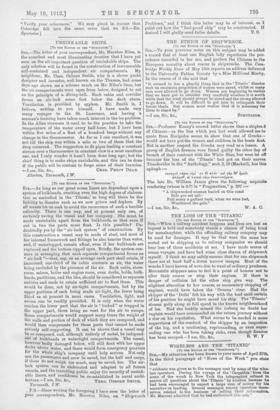THE LOSS OF THE TITANIC.'
[To THE EDITOR OP THE "SPECTATOR."] Sin,—When a railway accident happens and lives are lost an inquest is held and somebody stands a chance of being tried for manslaughter, while the offending railway company may be sued for damages. It may be that were the same law meted out to shipping as to railway companies we should hear less of these accidents at sea. I have made scores of ocean voyages and have had some close shaves of shipwreck myself. I think we may safely assume that for one shipwreck there are at least half a dozen narrow escapes. Most of the wrecks I have known of were duo to want of ordinary prudence. Mercantile skippers seem to feel it a point of honour not to alter their course or stop their engines. If there is danger of collision let the other ship give way. The slightest alteration to her course, or momentary stopping of engines, would have taken the ' ()mane' clear. Had the skipper of the Delhi' felt his way with the lead until certain of his position he might have saved his ship. The Titanic' steams gaily along at full speed in the known neighbourhood of ice. Had she luckily missed the iceberg no doubt her captain would have commanded on the return journey without a slur on his reputation. What seems to be needed is some supervision of the conduct of the skipper by an inspection of the log, and a cautioning, reprimanding, or even super- seding one who has been taking risks, even though disaster has been escaped.—I am, Sir, &o., R W. Y










































 Previous page
Previous page